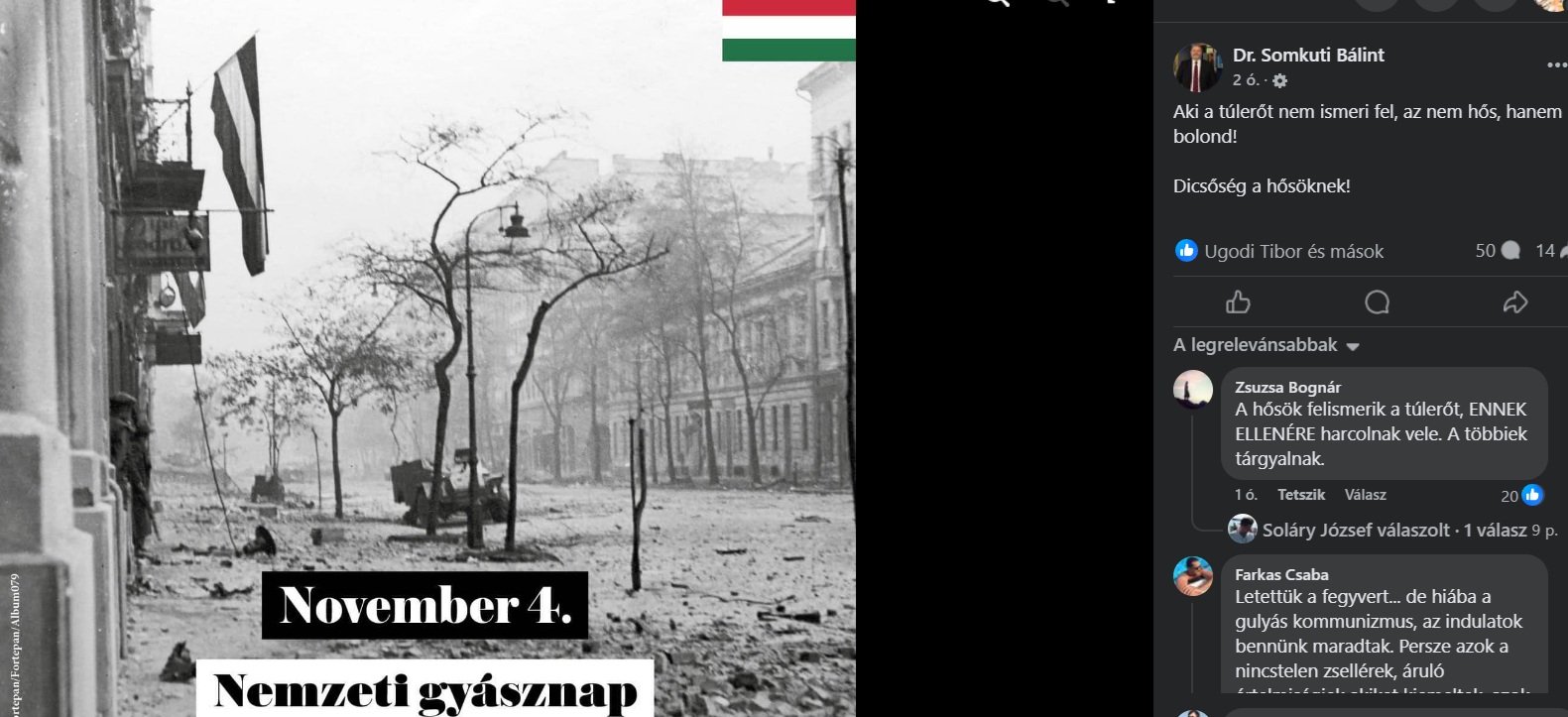“He who does not recognise overwhelming force is not a hero, but a fool!” – wrote Bálint Somkuti, a researcher at the Research Institute of the Hungarian Sovereignty Protection Office, on the anniversary of the suppression of the ’56 Revolution.
Bálint Somkuti, a researcher at the much-criticised Research Institute of the Hungarian Sovereignty Protection Office, announced his appointment a month earlier in a separate statement. The research institute is headed by József Horváth, an internal intelligence officer of the former party-state, Division III/III.
Today is the 68th anniversary of the suppression of the 1956 revolution, and Somkuti thought it was the right time to denounce the Hungarian revolutionaries who defended their homeland openly.
In addition, according to Gulyáságyú Media, Somkuti originally wrote that “anyone who does not respect the enemy is not a hero, but a fool”, but later amended this.
This is also interesting because he then writes, “Glory to the heroes!” which, presumably, in his understanding, refers to Soviet soldiers and Hungarians who did not participate in the resistance.

Since the regime change in 1989, Hungarian society has generally held revolutionaries in high regard, regardless of political affiliation. Only during the socialist era did communist educational materials cast revolutionaries in a negative light, according to *Helló Magyar*. This attitude, however, appears to be shifting, with an increasing number of public officials and members of Viktor Orbán’s government now viewing past revolutions as unnecessary patriotic exercises. They believe it might have been more pragmatic to surrender rather than defend the homeland at great cost. Most notably, Balázs Orbán, an advisor to the Prime Minister, recently endorsed this perspective, saying the Orbán cabinet would NOT have defended Hungary in case of a Russian invasion.
Previously, government official Tamás Somkuti had made a similarly controversial remark about the 1956 revolution, which drew significant public backlash. He recently stated that it was beneficial the West did not intervene on Hungary’s behalf in 1956, suggesting otherwise, Hungary’s fate might have mirrored that of present-day Ukraine.
The Hungarian government seems to be cultivating a new narrative to erode society’s reverence for Hungarian revolutionaries. Initially, a few officials voice these views, setting the stage for the sentiment to gain wider acceptance over time. Although the exact motivation remains unclear, it is presumably intended to encourage greater public alignment with Russian actions by downplaying the heroes of 1956.
Meanwhile, the Hungarian flag was lowered to half-mast outside Parliament, commemorating those who sacrificed their lives for Hungarian freedom. Photos can be viewed here.
Read also: North Korean foreign ministry praises PM Orbán for anti-EU stance
UPDATE
Update
It doesn’t need much explanation, the office was right to react to their employee’s outburst against revolutionaries:
“Today, the Hungarian Sovereignty Protection Office terminated the contract of Dr. Bálint Somkuti with immediate effect.”
Fidesz is working hard to condition Hungarians to the idea to submit to Russian domination and create conditions to eventually completely leave the West including the NATO umbrella and become wide open to Russian control. Everything this government has been doing for years with its’ propaganda and its’ behaviour points in that direction. Particularly alaming was Hungary attending a Russian security meeting in Belarus along with the Syrian dictators but being absent from a NATO security meeting called in Budapest. 2026 is your last chance Hungarians. If you don’t get rid of these Russian ass-lickers then you are finished.
After this statement how can Hungarians be oblivious to the real purpose of Fidesz’s Sovereignty Protection Office? It was modelled on what Putin put in place years ago in Russia to suppress all opposition.
russia thinks of the Hungarian Uprising as a ‘fascist rebellion’ put down by heroic socialist soviets
Unsurprising that the Hungarian government undersells observations of the anniversary and prefers to attack Brussels rather than remember its heroes — doing that might upset Orban’s russian bosses.